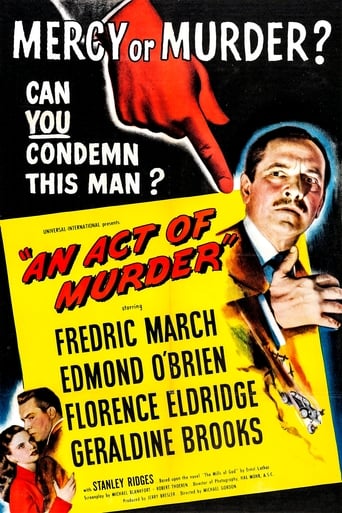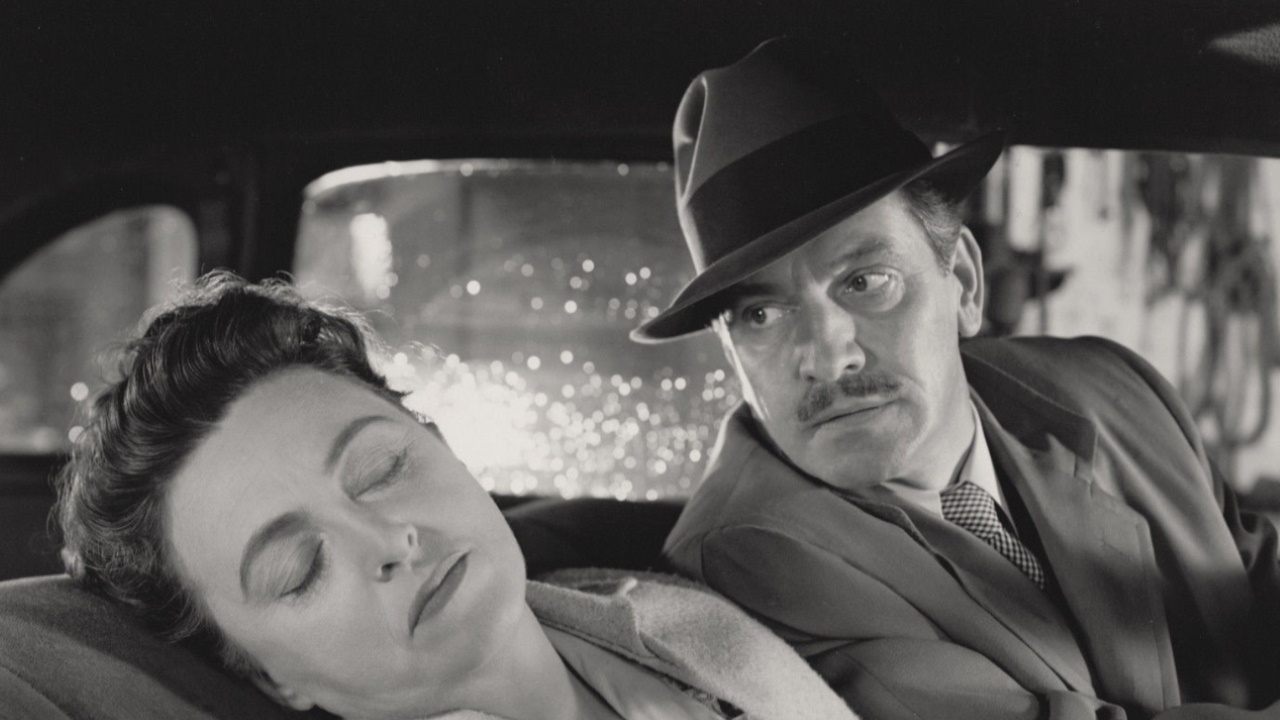blanche-2
Note: Today I went to hospice and said goodbye to a member of my family who has a brain tumor. So this movie resonated.Frederic March, Florence Eldredge, Geraldine Brooks, and Edmond O'Brien star in "Act of Murder," a 1948 film directed by Michael Gordon.March and Eldredge play a happily married couple, Judge Calvin and Catherine Cooke. They have a daughter (Brooks) engaged to an attorney (O'Brien) whose views are not the same as the Judge's.Catherine is suffering from severe headaches, so she sees a doctor. It turns out she is terminally ill. Apparently the practice in those days, in movies anyway, is not to tell the sick person that he or she is terminal. He does inform her husband.Catherine believes there is nothing wrong with her. The Judge decides to take her on a trip, a second honeymoon, during which she becomes violently ill and in intractable pain. When Calvin sees a wounded dog shot on a sidewalk so it wouldn't suffer, the wheels start turning.This is a story about euthanasia, a topic still hotly discussed today. Here is a man who loved his wife desperately, to the point where her pain was his as well. There's a story in Dirk Bogarde's biography about the horrible death his companion suffered; at one point, when he and another turned him during the night, his companion said, "If I were a dog, you wouldn't do this to me." It made Bogarde a proponent of euthanasia."Act of Murder" is a beautifully made movie, heart-wrenching and powerful, nominated for the Grand Prize at Cannes in 1948. The camera work by Hal Mohr is exceptional. As Catherine's and Calvin's world becomes darker and darker, we see it.Frederic March and his wife, Florence Eldredge are absolutely fantastic. They were the original stars on Broadway of Long Day's Journey into Night, and they must have been wonderful. An interesting play, like Streetcar, the focus can shift from the man to the woman, depending on the director and actors.See March and Eldredge in this film.
MartinHafer
I watched "An Act of Murder" because I love the actors Frederic March and Edmund O'Brien. Both were Oscar-winning actors who were not exactly handsome (especially as they aged) and managed to give one impressive performance after another over the decades. Sadly, however, despite having two excellent stars, the film lost its momentum towards the end.When the film begins, March plays a tough-as-nails judge and O'Brien a bleeding-heart defense attorney. The two don't like each other all that much--and late in the film, O'Brien's character comes to the judge's defense when he's on trial for a mercy killing. In between is the part of the film I loved most--and which is totally obscured by the ending which is filled with speechifying and some bizarre behavior by March's character. It's a shame, as the idea of mercy killing and medical ethics are really interesting topics and it's pretty amazing to see them talked about in the 1940s, as usually films deliberately avoided this back in the day.
kapelusznik18
***SPOILERS*** One of if not the first film out of Hollywood that tackles the subject of mercy killings that has honorable and straight laced, in going by the book, Judge Calvin Cooker, Fredic March,come to realize that there are extenuating circumstances in cases that he presides on that is not explained in the law that he's sworn to upholds. This comes crashing down on his head when his wife Catherine, Florence Eldridge, is diagnosed with a fatal brain disease that will slowly end her life, with her brain turning into mush, in excoriating pain. It's later in the movie when the Judge can't take it, his wife's suffering, anymore that in a fit of madness drives his car with his wife Catherine in it off the road where she ends up dead and him suffering severe head shoulder & leg injuries!Even though exonerated in Catherine's dead Judge Cook feels that he in fact murdered her and wants to pay for his crime even if it meant life imprisonment or worse. Having attorney David "Double D" Douglas, Edmond O'Brien, given the job to defend Judge Cook , who refused to defend himself, it's decided the only defense for his action is an insanity defense in that he wasn't in his right mind at the time of the crime that he's not only accused of but admitted to! It takes a lot of work on "Bouble D's" part to not only convince the judge & jury but himself as well to Judge Cook's innocence. In that the man, Judge Cook, was out of his mind at the time of his wife's death but it wasn't him that killed her! It turned out that Catherine herself was the one who did herself in before her husband Judge Cook had the chance to do it!***SPOILERS*** It was Catherine who found out the truth of her fatal illness in going through her husbands papers and knowing what she's in store for, a slow and painful death, that she decided to put herself, in taking a bottle of powerful pain killers, out of her misery. In an autopsy preformed on her on the insistence of Judge Cook's attorney David "Double D" Douglas reviled that Catherine was in fact dead before the car that her husband drove off the road hit the bottom of the gully that it landed in! The ending of the film was a bit of a cop-out in having Judge Cook not going through with his planned mercy killing of his terminally ill wife. But with the movie released in 1948 him really going through with it and being found innocent was totally unthinkable at the time by the movie going public.In fact there was an even more poignant moment in the film a bit earlier when a man's best friend, his dog, was hit by a car and was, as his owner was in tears, mercifully shot and killed by a policeman at the scene. It was that tragic incident that gave Judge Cook the idea to do the same thing, in a car crash, to his wife to keep her from going through the same kind of suffering that the fatally injured canine was going through!
jarrodmcdonald-1
I recorded this film last night on TCM and I am watching it now. I think it is rather well made, with some extraordinary performances, but a few things do not work for me. First, I want to discuss the scene where she experiences wincing pain and breaks the mirror in the bedroom while she is packing. We get this quick dramatic scene and then it is not mentioned again. Of course, the filmmakers are letting us know, by foreshadowing it, how fatal her prognosis is. But how did she explain to her husband the mirror getting broken? And even if she had it fixed without his knowledge, wouldn't she know at that moment that there is something terribly wrong with her? People having good days do not go around smashing bedroom mirrors.Second, and this plot point might seem minor, but why is it that when they pack to go on their trip he takes the note explaining her full medical condition? Obviously, the filmmakers have neatly included it in his suitcase so that she can find it and learn about her situation. But wouldn't he have have left this information in his office or already sent it on to the local physician?And third, now this is what bothers me most, because it is certainly not addressed-- but when he gets behind the wheel during the raging storm with his wife in the passenger seat-- how does he know that his plan to kill her will be successful? What if he kills himself in the process, too? Can we assume that he was not only homicidal but suicidal as well? Yet, did he ever take into account the possibility that he may not survive the wreck but his wife could? If so, what good would that accident have done? Obviously, in the very next scene we see that his plan apparently succeeded and the only visible evidence that he was even in a serious crash is the cane he walks with for the rest of the picture. He has no disabilities or scars (not even a bruise or scratch) while his wife conveniently (and mercifully?) experienced a much more final outcome.Finally, another thing that didn't make sense to me is: when did she figure out he was giving her something stronger than aspirin? And how was she to know how toxic it was? So was her overdose intentional or accidental? This is not really explained, even later at the trial. It seems a bit hard to believe that she would have put the drugs into her purse without him realizing that she had taken them. What seems to be happening at one turn after another in this picture is that the filmmakers are trying to dramatize a philosophical thesis about mercy killing. But because they have fully worked out all the plot details, we are left to wonder if this could have been a better film than it is and if the points could have been made more smoothly and convincingly. As it is we are left with an artistic statement about a difficult decision regarding the quality or end of life, but we are given it in uneven terms and in a scope that is overshadowed by contrivance instead of the social realism they may have been striving to attain.


 AD
AD


